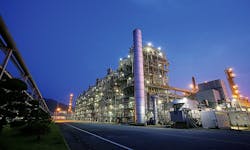Eni, LG Chem weigh joint biorefining project in South Korea
Eni SPA subsidiary Eni Sustainable Mobility SPA (ESM) and LG Chem Ltd. have launched preliminary studies to evaluate the potential for jointly developing and operating a grassroots biorefinery to be built at LG Chem’s integrated petrochemical complex in Daesan, Chungcheong Province, South Korea, 80 km southwest of Seoul.
Aligned with both companies’ shared objective to meet growing demand for sustainable, low-carbon fuels and plastics, the proposed Daesan biorefinery would use the Eni-Honeywell UOP LLC codeveloped proprietary Ecofining technology for flexible processing of about 400,000 tonnes/year of renewable materials for production of sustainable aviation fuel (SAF), hydrotreated vegetable oil (HVO, or renewable diesel), and bionaphtha, the companies said on Sept. 14.
As part of the potential project, Eni said it would use its existing global supply chain to provide the proposed biorefinery with sustainable feedstock that includes mainly waste and residues from the processing of vegetable oils, and used cooking oil, but also vegetable oils derived from drought-resistant crops in degraded, semi-arid, or abandoned soils not in competition with the food chain.
With technical and economic feasibility assessments for the joint development already under way, the companies said they expect to take final investment decision on the possible project by 2024.
If approved, ESM and LG Chem said the proposed biorefinery—which would leverage the Daesan complex’s integrated value chain, including existing utilities and logistics infrastructure—would be completed by 2026.
The proposed Daesan biorefinery follows a series of recent projects and partnerships Eni has formed with operators abroad to increase the Italian firm’s production share of renewable transportation fuels in line with its broader, long-term corporate plan of gradually decarbonizing to achieve net-zero emissions across operations by 2050, as well as to help customers meet their respective decarbonization and sustainability goals (OGJ Online, June 29, 2023; Apr. 3, 2023).
Eni first began producing biofuels in 2014 by processing vegetable oils and biomass waste into HVO following conversion of its former 80,000-b/d Venice refinery at Porto Marghera, Italy. Since then, the operator has remained the country’s sole HVO biofuels producer and become Europe’s second largest via ongoing transformations of its conventional Italian refining operations, including a mix of proposed grassroots and expansion projects to grow in-country renewables production capacity (OGJ Online, Oct. 18, 2022; Oct. 15, 2021).
About the Author
Robert Brelsford
Downstream Editor
Robert Brelsford joined Oil & Gas Journal in October 2013 as downstream technology editor after 8 years as a crude oil price and news reporter on spot crude transactions at the US Gulf Coast, West Coast, Canadian, and Latin American markets. He holds a BA (2000) in English from Rice University and an MS (2003) in education and social policy from Northwestern University.

